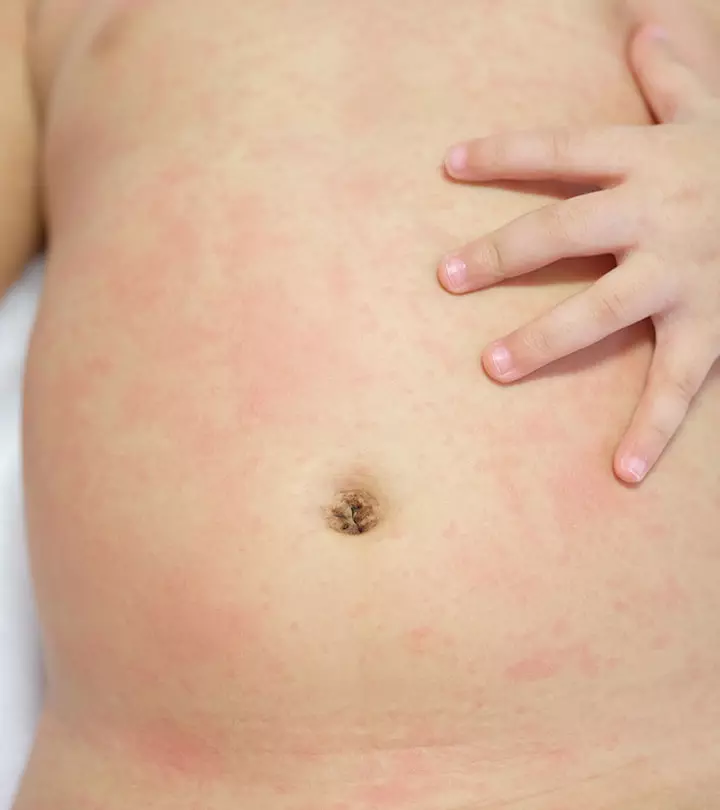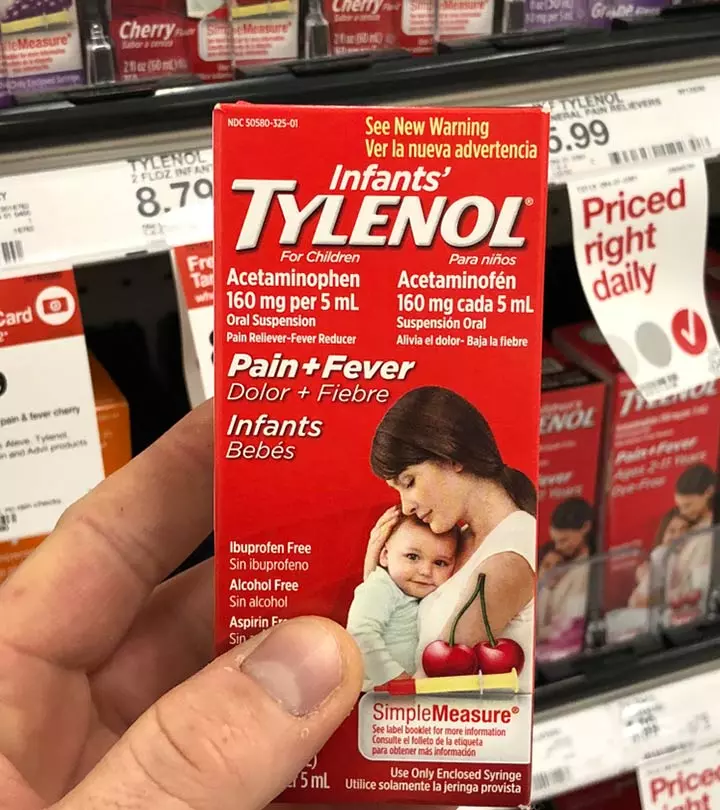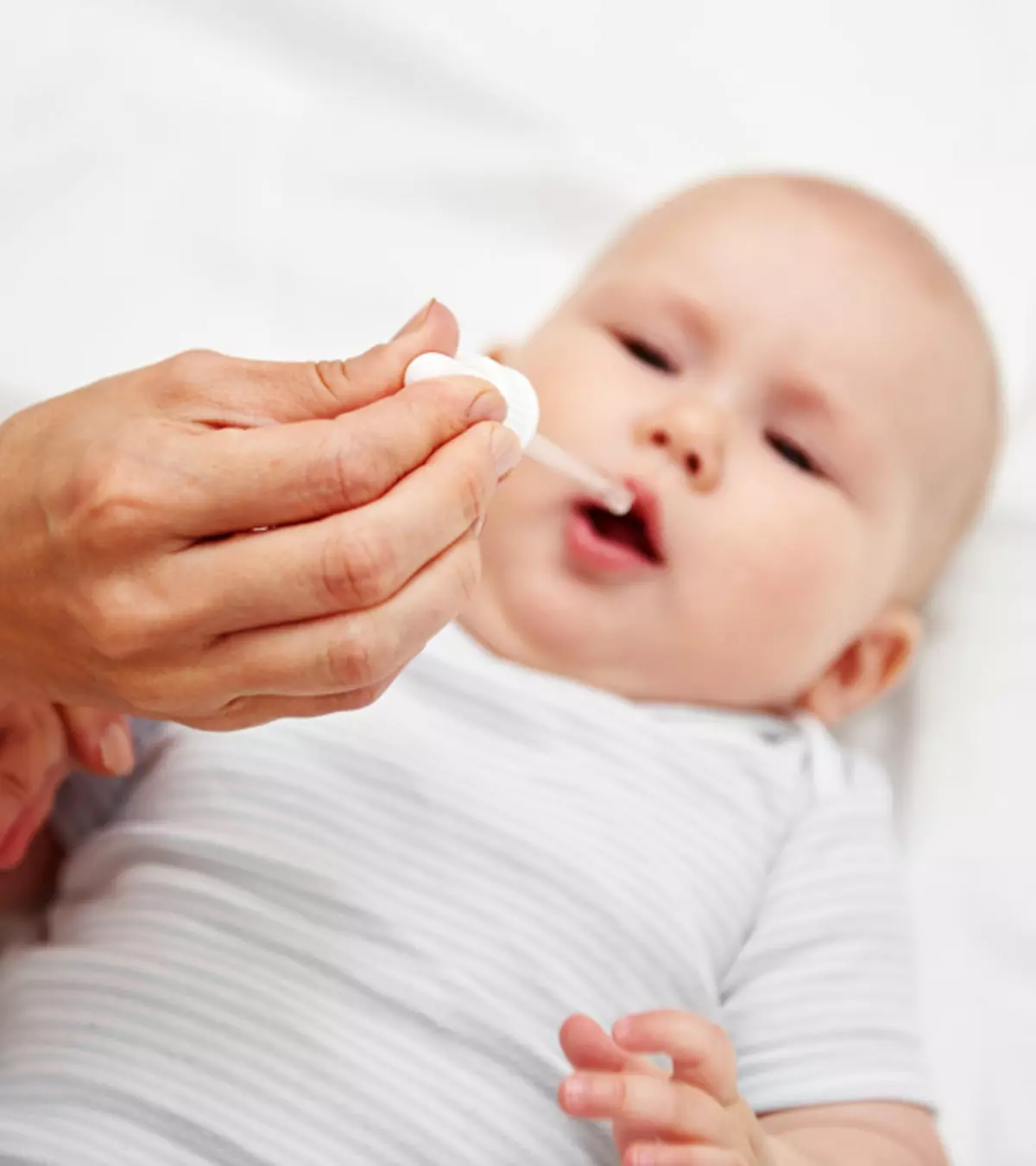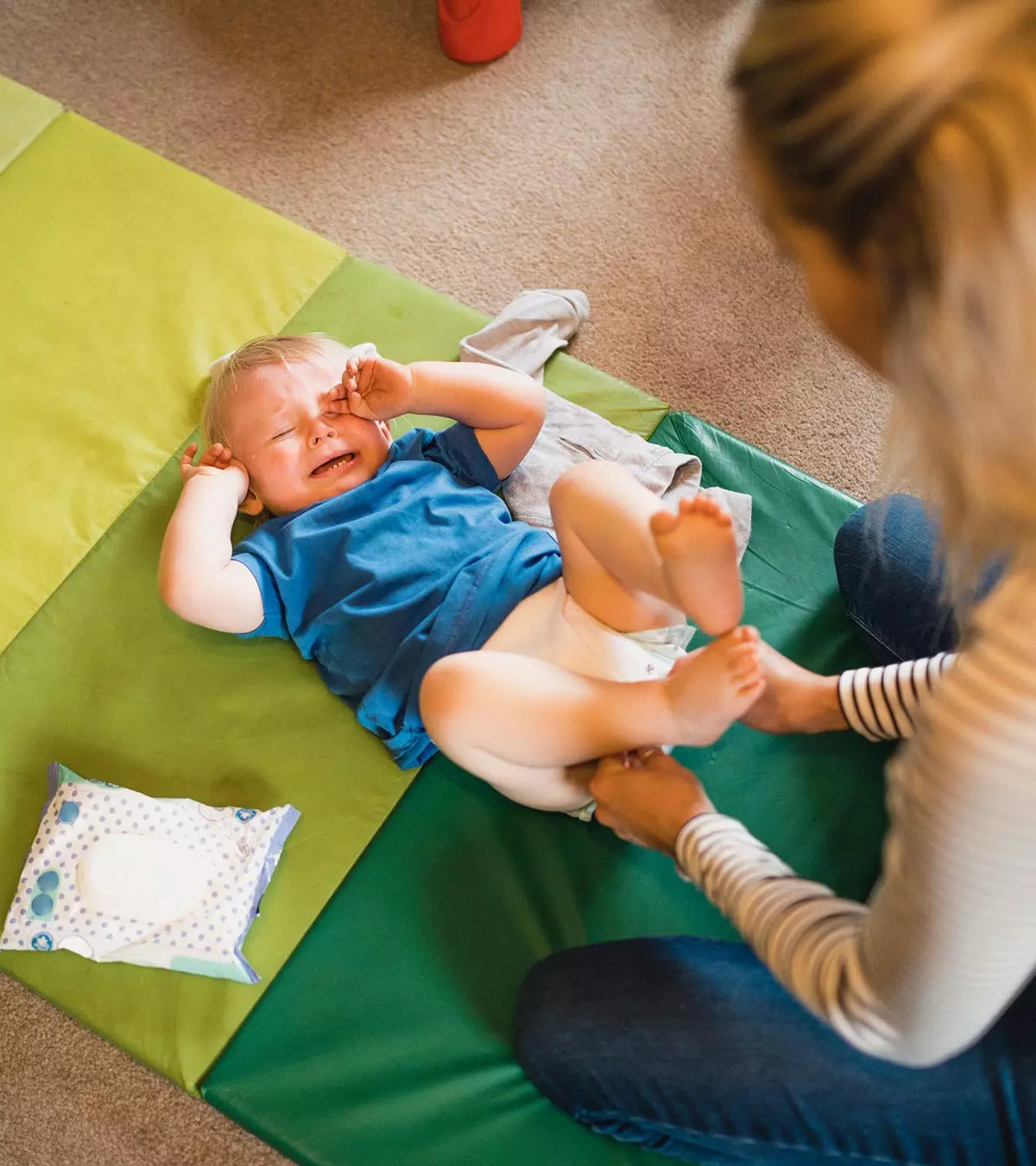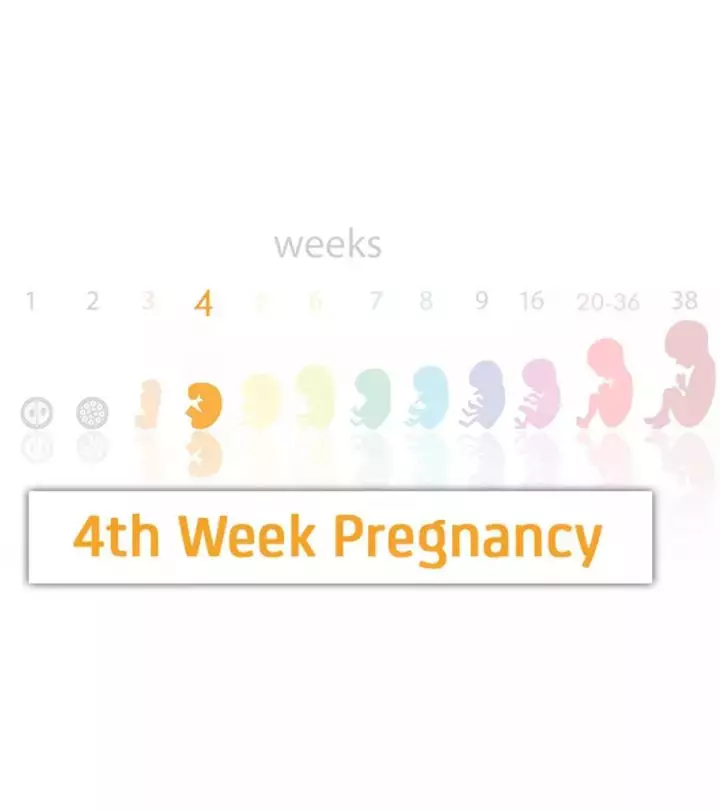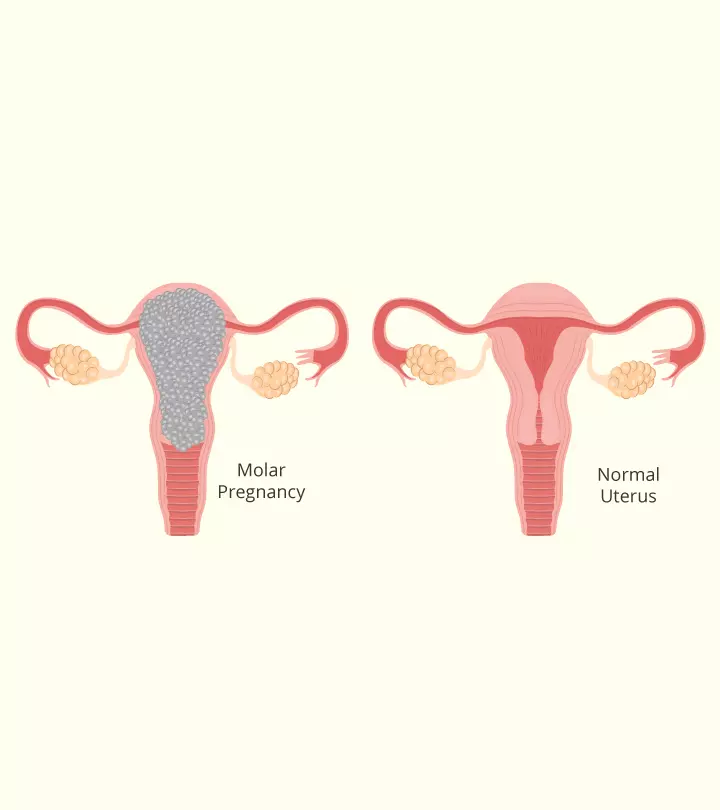
Image: MomJunction Design Team
Coughing is one of the body’s defense mechanisms of getting rid of phlegm, mucus, sputum, postnasal drip, or a foreign body. A variety of factors can cause cough in babies, and while coughing is a necessary function, it is unhealthy for a newborn to cough excessively. If your infant coughs a lot, you should see a pediatrician (1). Read this post to learn more about infant coughs, their types, causes, treatment, and prevention methods.
Key Pointers
- A cough can be accompanied by other symptoms such as wheezing, fever, and vomiting.
- It is important to consult a doctor if your baby experiences breathing difficulties, breathes faster than usual, if your child’s lips, face, or tongue turn blue, if they have a high fever or cough up blood.
- A baby’s cough can be caused by various factors, ranging from teething to severe bacterial infections such as pertussis.
- Coughs are typically treated with antibiotics and supportive therapies, but cough syrups are not usually recommended for children.
- To treat a cough at home, it’s best to get plenty of rest, fluids, use a humidifier, use saline drops for stuffy nose, wear warm clothes, and avoid irritants.
Types Of Baby Cough
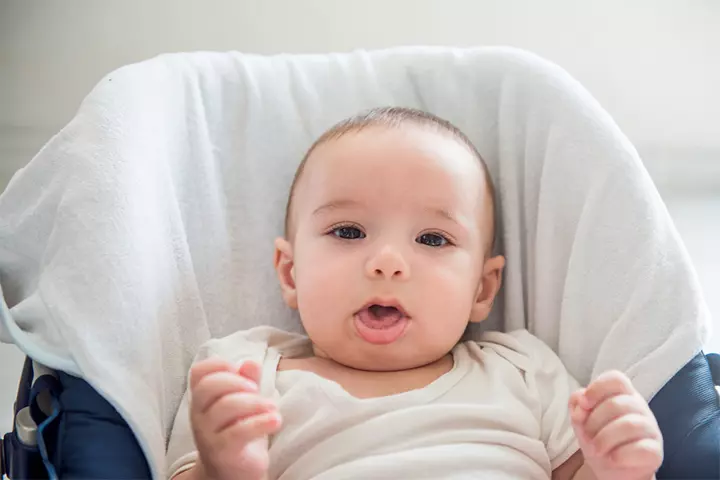
If your baby has been coughing lately, understanding the type of baby cough can help you determine the possible cause and management. Cough can be classified based on character, duration, quality, and timing as follows (2) (3).
- Acute cough: A sudden onset of cough that lasts from a few days to less than three weeks.
- Subacute cough: Lasts around three to eight weeks. Slow in onset.
- Chronic or persistent cough: Lasts more than eight weeks, usually from allergies or asthma. It occurs off and on. It can also be due to infections.
- Dry cough: Non-productive cough where there is no sputum production. Generally hacking cough.
- Wet cough: Productive cough (phlegm) with sputum.
- Nocturnal cough: Occurs at night and can be due to postnasal drip (mucus from nose and sinus drain to throat) or asthma. Mainly allergic cough.
- Daytime cough: Occurs during the day and can often be allergic to smoke, air fresheners, pets, etc.
Cough can be classified based on their character, which is the nature of air’s movement during the cough (3).
- Barking cough: It can be due to swelling and inflammation in the upper airway, usually the larynx and trachea, due to the pneumoniaiA bacterial or viral infection causing inflammation and fluid accumulation in the air sacs in toddlers and infants” ] that interferes with taking the breath in. Inspiration. It may start suddenly during the night. You may hear stridor, which is a loud noise from harsh breathing while inhaling air. It is caused by croup (4).
- Whooping cough: It is a type of continuous cough without gaps to breathe in between coughing. The whooping sound is heard when the baby takes a deep breath at the end of the coughing episode. It is caused by pertussis infection by bacterium Bordetella pertussis and is common in unvaccinated babies under the age of one year (5).
It is a contagious infection and can have severe effects on babies. The accompanying chart illustrates the pertussis frequency in children of various age groups. According to the US Centers for Disease Control and Prevention (CDC), pertussis most commonly affects babies under one year old because their immune systems are underdeveloped (15). Vaccination against pertussis is vital in preventing the spread of the disease, particularly to those most vulnerable, such as infants.
 Quick fact
Quick fact- Staccato cough: The baby breathes in between each cough. It is a characteristic symptom of chlamydial pneumonia in babies (6).
Symptoms Associated With Baby Cough
Coughing by itself can be a symptom of respiratory tract infection or a simple reflex to an irritant such as smoke. The following symptoms could also occur along with cough in babies (3):
- Cough with wheezing: If you notice your baby wheezing, it’s important to pay close attention. Wheezing is a whistling sound that occurs while breathing out (expiration). The whistling sound can be heard from a distance. The child becomes breathless. It can be due to lower airway tract infections such as viral pneumonia, asthma, or bronchiolitisiA viral illness that makes the airways constrict, making breathing challenging or due to foreign bodies such as food or small toys.
- Cough with a fever: Your baby may get a mild or high grade fever depending upon the severity of infection, whether mild flu or pneumonia. Body temperature more than 102°F (39°C) can be due to infections such as pneumonia.
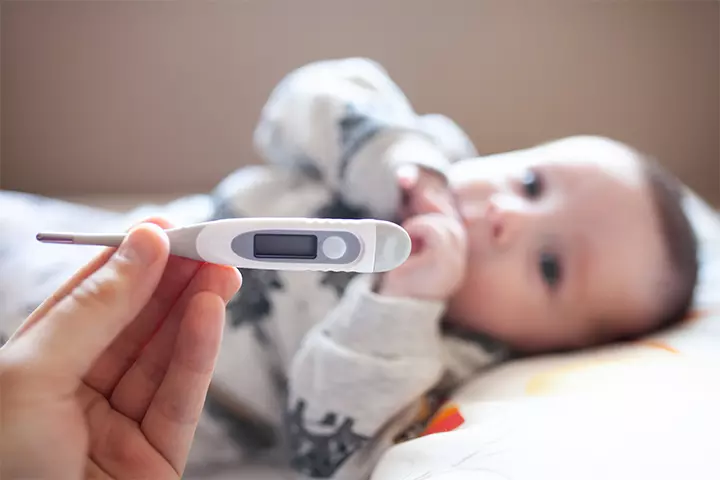
- Cough with vomiting: If your baby has asthma or cold, they may vomit due to excess mucus accumulated in the stomach due to swallowing it. Or the mucus can get collected in the upper throat. Sometimes, they may vomit due to the stimulation of gag reflex while coughing.
When Should You Call The Doctor?
It is recommended to contact a pediatrician if your baby has a cough. However, your baby may require immediate medical care in the following circumstances with cough (3) (7).
- Difficulty in breathing
- Breathing faster than usual. Generally depending on the age but respiratory rate more than 40 per minute.
- Chest indrawing.
- Blue color of the lips, face, or tongue
- High fever
- High fever with cough, without a stuffy or runny nose
- High or mild fever in infants less than three months old
- Cough more than few hours in infants younger than three months
- Whooping sound after cough
- Barking cough
- Coughing up blood
- Stridor (sharp sound while breathing)
- Wheezing
- Tiredness and irritability
- Dehydration symptoms such as dry mouth, sunken eyes, no tears, and less urine
What Are The Causes Of Coughing In Babies?
Baby’s cough can be due to various factors ranging from teething to severe bacterial infections such as pertussis.
Respiratory infections like common cold, flu, and others may also cause a cough. The US Centers for Disease Control and Prevention reported that in 2021, approximately 18.9% of children experienced seasonal allergies, which can also result in cough (16). The common causes include (8):
- Viral infections such as the common cold, croup, etc., are caused by viruses such as rhinovirus and others.
- Bacterial infections of airways such as pertussis
- Allergic cough
- Asthma
- Sinusitis
- Pneumonia
- Bronchiolitis
- BronchitisiInflammation of the bronchial tubes caused due to a viral or bacterial infection
- Gastroesophageal refluxiA condition that occurs when stomach acids flow backward into the esophagus
- Congenital heart and respiratory problems
- Foreign bodies
- Cystic fibrosisiA genetic disease characterized by the build-up of mucus and affects the lungs, digestive system, and other organs
- Airway irritants
- Aspiration of food
- Teething due to excess saliva
- Habitual cough
Diagnosis Of Cough In Babies
Your doctor makes a diagnosis by hearing the type of cough and other signs and symptoms. The diagnostic tests to identify the cause of cough may include the following.
- Blood test
- Chest x-ray
- Sputum culture
- BronchoscopyiA technique in which the professionals use a tiny tube to view your lungs and diagnose lung disorders
Treatment Of Cough In Babies
In most cases, coughs After identifying the cause of the cough, your doctor will recommend the appropriate treatment. The treatments may include (14) (17):
- Cough due to bacterial infections requires antibiotic treatment. However, it is important to note that antibiotics cannot treat coughs.
- Viral coughs are usually self-limiting and usually lasts for two to three weeks. However, supportive therapies including regular breastfeeding or formula feeding for hydration are required for a viral infection-related cough.
- If your baby has a fever above 102° F (39° C), you may give acetaminophen or ibuprofen to reduce fever; however, make sure to talk to the pediatrician first. However, strictly avoid giving ibuprofen to babies under six months of age.
- Cough medicines are usually not recommended for children.
 Quick fact
Quick factThe U.S. Food and Drug Administration advises to not give over-the-counter cough syrup or cough drops to your baby under two years of age. This is because OTC medications for colds and coughs can put the baby at risk of causing serious complications such as slow breathing, choking, etc. (9).
Even homeopathic medicines marketed for coughs and colds have been found to adversely affect children under four years of age. Some serious complications associated with these medications in children are breathing difficulty, seizures, allergic reactions, and low blood sugar and blood potassium levels (9).
How To Prevent Cough In Babies?
The following factors may help prevent cough in babies.
- You can prevent exacerbation of asthmatic cough by following prescribed medication.
- Do not give small toys, which may be choking hazards.
- Keep the baby away from smoke, including tobacco smoke.
- Follow proper feeding techniques to avoid food aspirations.
- Get recommended vaccinations on time to protect them from illnesses and infections.
- Try to protect your baby from contracting viral illnesses such as flu or cold if you have it.
- Wear a mask and wash your hands before and after feeding or taking care of the baby if you have cold or cough symptoms.
- Cover your mouth and nose when coughing or sneezing.
- If possible, stay away from the baby if you’re experiencing sneezing and coughing.

Home Treatment For Babies With Cough
The following home remedies may help relieve cough in babies (7):
- Give plenty of fluids or breastmilk to soothe the throat and prevent dehydration.
- Make sure your baby is getting enough rest.
- Prevent the drying of the nose and throat by using a cool-mist vaporizer or humidifier near a baby crib.

- Saline drops can be used if your baby has a stuffy nose. Bulb syringe or other suction tools can be used to clean the nose in infants.
- Dress your baby in warm clothing in winter months.
- Keep away irritants such as pets, air fresheners, or dust from your baby.
- For babies older than one year, a teaspoon of honey or corn syrup before naps and bedtime can help thin mucus and loosen the cough. It can also help alleviate sore throat, causing cough (17) (10).
Mary, a mother of twins, shares about her homemade cough syrup recipe she used for her twins. She says, “The babies aren’t quite old enough for cough syrup nor do I like the idea of giving them medicine for every little thing. So my mom remembers that her mom used to give her homemade cough syrup and that it worked. So I thought I would give it a try. It is so simple! half cup of honey, half cup hot water, 3 tablespoons lemon juice. I give it to them before nap time and bed time. And since it is something you can not take too much of, they get it when ever they are coughing a lot. Once I started using it I noticed a big different and I’m just saying… this cold didn’t last as long as the rest of them. I wasn’t sure it would work at first, but it really does (i).” - If your baby has coughing fits, a warm mist from a shower can help to provide relief (17) (10).
Frequently Asked Questions
1. Why is my baby coughing but not sick?
If your baby is coughing (dry cough) continuously but showing no other symptoms of illness, a foreign object may be stuck in their airway. Therefore, seek medical attention immediately (8).
2. Is it normal for a baby to cough every day?
No. If your baby coughs daily for more than four weeks, it is considered chronic coughing. It can signify various respiratory diseases, such as allergies, sinusitisiAn infection in which the tissues that line the sinuses (hollow, air-filled spaces in the skull) get swollen or inflamed , asthma, and acid reflux (8). Contact your baby’s doctor even if they have only been coughing for a few hours (11).
3. Why does my baby cough more at night?
If your baby has a cold, you may notice that it worsens at night. This is because when lying horizontally in bed, their nasal congestion and sinuses drain down the throat, causing irritation. Additionally, cough caused by asthma can worsen at night due to increased sensitivity and irritability of the airways (12).
Cough in babies could be due to a temporary irritation to their airway or an underlying infection. If your baby is frequently coughing or shows any other symptoms of an infection, consult your pediatrician for prompt medical attention. The treatment would be provided based on the cause. Refrain from giving over-the-counter cough medications to children. Also, check with your physician which home remedies you could try with your baby (10). Note that home remedies may provide temporary relief only and may not be a permanent solution to cure cough.
Infographic: Ways To Prevent Allergic Cough In Babies
Getting rid of the common allergens may help prevent allergic cough in babies. Refer to this infographic to know the hidden culprits that may trigger cough in babies and get rid of them as soon as possible. Illustration: Momjunction Design Team
Illustration: Cough In Babies: Symptoms Causes Treatment And Prevention
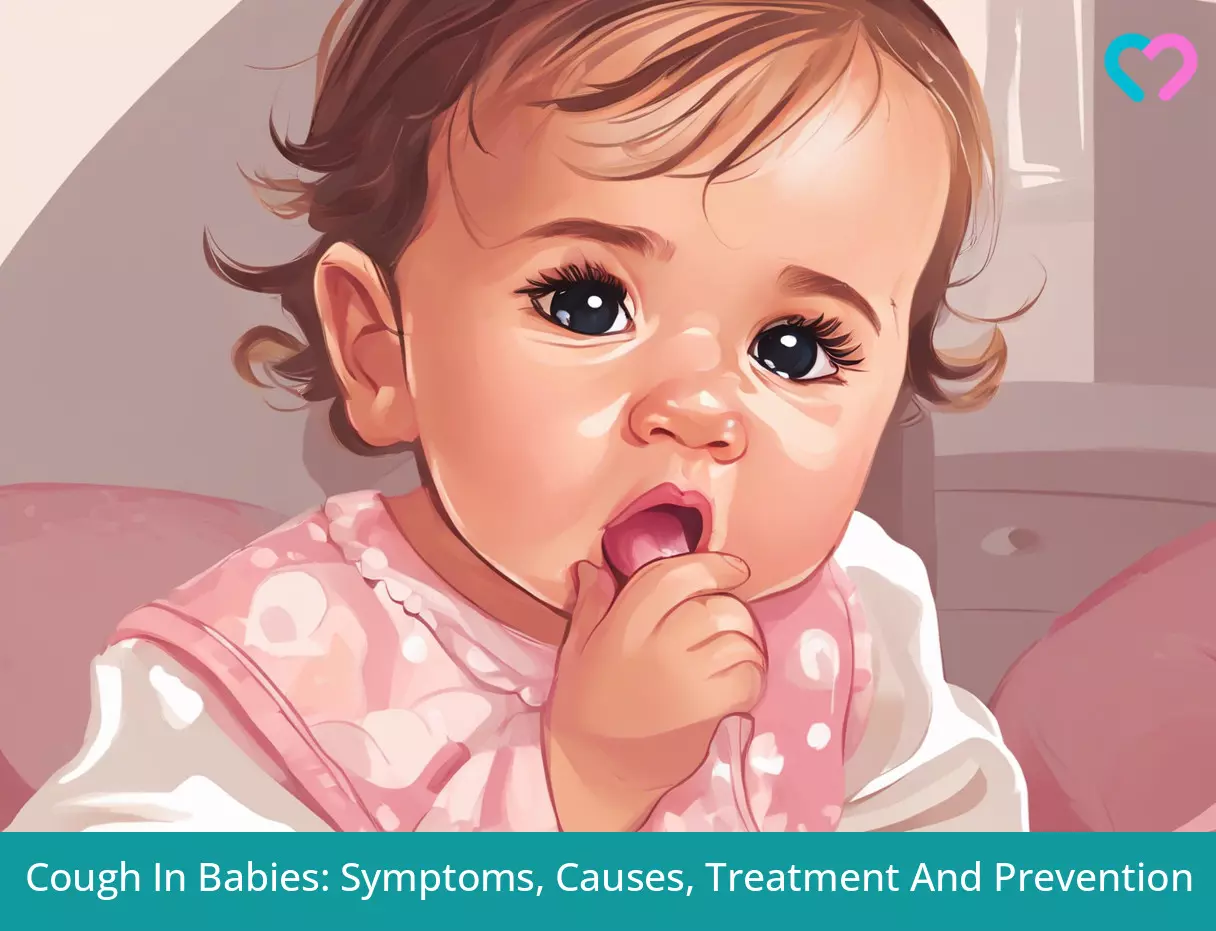
Image: Stable Diffusion/MomJunction Design Team
Personal Experience: Source
MomJunction articles include first-hand experiences to provide you with better insights through real-life narratives. Here are the sources of personal accounts referenced in this article.
i. DIY Natural Cough Syrup;https://adayinthelifeofthekuesters.blogspot.com/2013/02/diy-natural-cough-syrup.html?m=1
References:
1. Decoding Your Baby’s Cough; Children’s Hospital Los Angeles
2. Cough; The National Heart, Lung, and Blood Institute
3. Cough Symptoms & Causes; Boston Children’s Hospital
4. Croup; The United States National Library of Medicine
5. Symptoms of Whooping Cough; Centers for Disease Control and Prevention
6. Ronelle Vanessa Naidoo and Penelope Ann Bryant, Not every cough in bronchiolitis season is bronchiolitis; National Center for Biotechnology Information
7. Colds and flu in babies and children; Healthdirect; Government of Australia
8. 8 causes of chronic cough in kids; RUSH University Medical Center
9. When to Give Kids Medicine for Coughs and Colds; U.S. Food & Drug Administration
10. Coughs: Meds or Home Remedies?; Seattle Children’s Hospital
11. Key Coughs Parents Should Know; Children’s Healthcare of Atlanta
12. Coughing in Infants and Children Harvard Medical School
13. Whooping Cough: What Parents Need To Know; Healthychildren; AAP
14. Cough (0-12 Months); Seattle Children’s Hospital
15. Pertussis Surveillance and Trends; CDC
16. Diagnosed Allergic Conditions in Children Aged 0–17 Years: United States, 2021; CDC
17. Coughs and Colds: Medicines or Home Remedies?; Healthychildren; American Academy of Pediatrics
Community Experiences
Join the conversation and become a part of our nurturing community! Share your stories, experiences, and insights to connect with fellow parents.
Read full bio of Dr. Mubina Agboatwalla
Read full bio of Dr Bisny T. Joseph
Read full bio of Rohit Garoo
Read full bio of Shinta Liz Sunny












